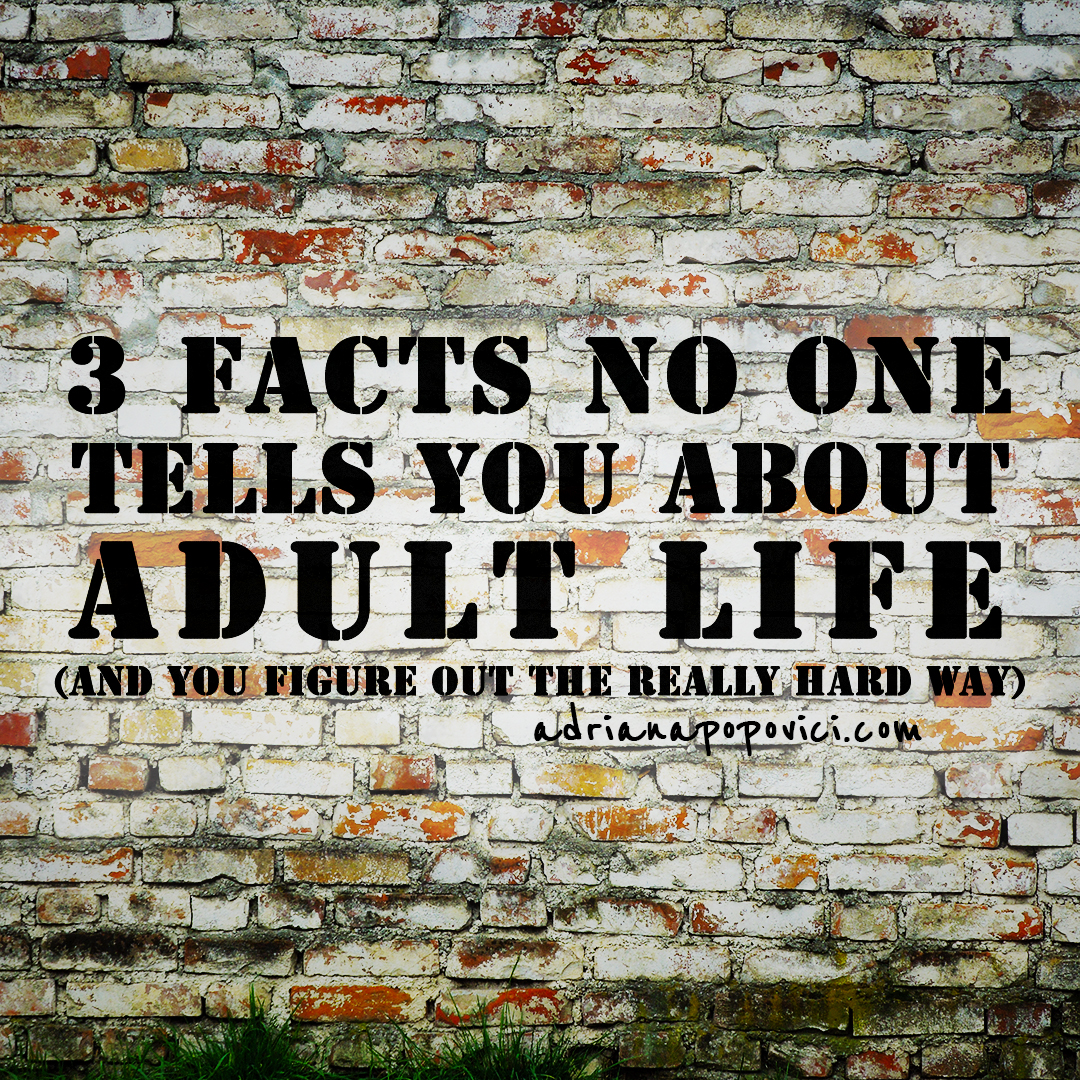All adults spend their lives figuring out how to be adults. If they don’t, they have limited their experience and/or knowledge to the degree that makes life more manageable to them.
When we are young, we look up to older people. In fact, the younger we are the more we idealize older age. Most kids can hardly wait to grow up and do all the things they are not able or simply allowed to do. We listen to older siblings, parents, teachers, because they are the source of answers to our early questions, and also because the outcome of our actions tends to validate their advice (and lectures). But, as we gain experience and develop confidence in our opinions, we start thinking we know pretty much all there is to know about life. And, next thing you know, you’ve become that know-it-all senior so inflexible in their ways they reject (almost) anything new, fresh, and young.
The demarcation between adolescence and adulthood is a biology-supported social convention. Once we turn 18, we’re legally adults, but this boundary has never prevented a child from being mature or an adult from being immature. The truth of the matter is that life is perpetual movement and change, and everybody is trying their best to navigate this ocean. The fact that we don’t always agree with, approve of, or simply understand each other doesn’t mean we’re not doing what we momentarily think is best in our individual situations – and, yes, that includes our stupidest mistakes.
Adult life is a source of infinite topics of debate and there are numerous articles that list all kinds of facts no one tells you about being an adult. Some are shallow, some deeper, and some are just silly. For example, having to buy your own toilet paper as an adult is a no-brainer no one tells you about because they don’t doubt your basic intelligence. It is somewhat disappointing to find such a fact listed as one of the surprises of adult life.
I thought I’d discuss three more complex issues that are seldom debated before or even after one reaches adulthood. Each of these issues are bigger pictures and have numerous ramifications. By understanding the broader context, details will be easier to tackle. Here we go.

1. People assume you’re properly instructed for life
Given that some of us apparently need to be told to add toilet paper to a shopping list, the assumption that we’re instructed for life is false. Joke aside, even if you have received all the education (curricular and extracurricular) your environment could provide, you still need practice.
We grow up rather sheltered. Most of us are provided with a place to live, food, hygiene and health care, basic education, and many amenities of the modern world. We have to deal with a minimal amount of issues, and there are many aspects of life that don’t even get discussed while we’re growing up.
It’s not much of a surprise that a 20-something is going to make lots of “mistakes” – it’s part of learning. The surprise comes when you realize there is little guidance available once you’re on your own in the “real world”. You’re out of school and no one is getting paid to correct your grammar and spelling anymore. You mess up at your job, and you probably get fired, not educated to do better. You try to make dinner but don’t know how to cook or use appliances, and end up setting the kitchen on fire – not even in “The Sims” did the fireman always show up fast enough.
There are books, coaches, counselors, therapists, and all other sorts of more or less expensive tools and professionals that can help you in life. There is also a lot of great information available for free. Still, in order to make something of it, you have to want to help yourself first. We basically have huge demand and supply of support and education, but no one to force-feed it to us anymore.
Once we’re adults, most other people do not feel any responsibility or drive to assist us in navigating through life. They have their own lives to tackle. Few people truly have the will AND the knowledge to constructively point out things you could improve about yourself or your life. Most don’t care or know enough, and some simply enjoy laughing at other people’s mistakes. Some people will treat you as if you’re out of time to learn, throwing a “what have you done up to this age?” in your face. Some may simply lack patience. Some are too busy or too tired. Usually, it is a combination of these.
People who offer constructive criticism, good advice and/or help are golden. Treasure them!
2. Milestones are conventional
This one is tricky, because most of these milestones are sneaked into our psyche early on in our childhood. Family and teachers present them as the natural order of life. To some extent, they are rooted in the axioms of human biology, in the natural cycle of birth, growth, aging, and eventual death each of us embodies. They also represent what society needs for perpetuation. The foundation of the human timeline is almost impossible to argue against. The timeline itself is a normative fabrication, though.
There is no easy, comfortable way to realizing this. Lifting this thin but distorting veil on our eyes comes with turmoil, and is one of the most profound disruptions of perception, as well as one of the most liberating – after the hurt, frustration, horror, and disorientation are cleared up.
I know, because I’ve been there. Here’s an example. One of life’s milestones is having children, and it is incontestably set by biological limitations. A woman’s fertility is limited in time, and her best chances at healthy successful pregnancy are in her twenties. I’m in my thirties, have never been pregnant, and my odds of bearing children decrease each year. But it is my choice – not a comfortable choice, not one that a lot of people agree with, and certainly not one I made on a whim. For reasons I am going to discuss in the future, I do not wish to have biological children (and prefer to adopt). Was it a scary thought process and emotional journey? Yes. Unlike other milestones, this one has an expiration date, is very important, and has quite a few implications. Knowing you might regret not doing things “at their time” makes you take introspection very seriously and ask yourself all the hard questions.
The fact that the majority of people abide by the “normal” milestones is not enough to make you happy by going the same route. Missing out on milestones might hurt you only if you buy into the popular belief that you don’t have to miss them. “You’ll regret it,” some often say when trying to convince you to go the conventional way. However, they never seem to tell you that you may very well end up regretting going for those goals you were told you should chase.
This doesn’t mean you have to go against everything you’re told you should do. My point is that the choice is yours and so is the responsibility. The road that is your own is unmarked. You mark it with what is important to you, what fulfills you, but also with your mistakes, lessons, and regrets. Nobody but you can identify with precision what it is that you need in this life, what you want, what path you should choose. Sometimes, you yourself are clueless about these things. Unexpected life-altering experiences may force you to redefine yourself and your life someday. These valid possibilities and realities of life set you up for failure in the conventional timeline of human existence, because there is no place for them in that blueprint. But they are real, and when you have to deal with an accident or an illness that discontinues every aspect of your life, the milestones show their irrelevance. If the conventional milestones implemented early in our brains were natural, deviation from them would endanger or even end our life – but life doesn’t end if you don’t get married by the time you’re 40.
Exploring life step by step, being totally honest with yourself, paying attention to your inner voice, developing a lucid practical analytical mind, continuously educating yourself, are safer bets and more natural routes in life than just doing what everybody else seems to do and scare you into.
3. You get to choose what is important
Can you remember the time you didn’t have any clue what the word importance meant, that time before the adults in your childhood told you what was important? Remember how riding your bike felt much more important than doing homework? Soon, homework became more important because the consequences of not doing it were constricting and unpleasant. From that point on, our notion of importance gets corrupted by outside interference, and we are mislead into thinking that higher authorities decide (and often impose) what is important. We also learn to evaluate the importance of things based on projected rewards or punishments. The biggest problem with all this is that many of us end up feeling overpowered and helpless over how we should design our own lives, and, as a consequence, we allow external factors and entities to dictate our choices – directly or indirectly.
In reality, each moment of each day is an opportunity to detect, decide, and implement what is important to you. If you don’t do it consciously, you might be swept away into things that are important to others, but not to you. The goal is to establish a good balance, a healthy intersection of values and satisfaction with the outer world.
It may not always be obvious or easy to identify what is important to you. Follow where your attention, time, and other resources flow. Your investments and priorities reflect what you need and think is important – and some of those things might be well hidden or disguised.
Importance in itself is meaningless. It resides in the impact of the subject. Timing matters, too. The importance of showing up for work on Monday morning is way higher than on Saturday night… unless you work weekend nights. Urgency boosts importance, as well. If a plumbing pipe cracks and water spurts in your kitchen, it’s important to tend to it immediately. In that situation, any other activity goes down the importance scale.
We have the tendency to think that we’re universally right about what is important, but what is important to you, may very well not be of any interest to someone else, and vice versa. There is always some person, group, or institution ready and eager to harness you to their own interests. If you are clear about your values and priorities, if you know what is important to you, your adult life will turn out fine.

Bottom line: be grateful and happy for the support you receive in your adult life, live and appreciate your own story, and contribute to what is important to you.